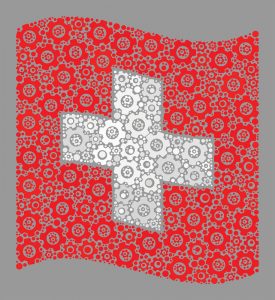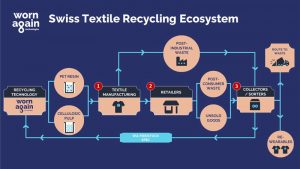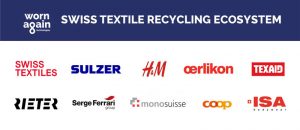
Worn Again Technologies initiates Swiss Textile Recycling Ecosystem
TW Special Report
Worn Again Technologies (WAT) has announced the launch of the Swiss Textile Recycling Ecosystem. Bringing together key industry players across the entire textile value chain, the initiative will support the creation of a circular economy based on Worn Again Technologies’ innovative polymer recycling technology.
To cause a paradigm shift in the fashion industry and realize true circularity requires all members of the value chain to be on the same page and working towards the same goals. The Swiss Textile Recycling Ecosystem is a network comprising fabric and textile manufacturers, waste collectors and sorters, as well as retailers, brand owners and technology providers. All these parties will cooperate to make their shared sustainability vision for the sector a reality.
The partners will provide different types of textile waste to Worn Again Technologies’ demonstration plant, which will process 1,000 metric tons of material per year and is being built near the WAT’s technology scale-up partner, Sulzer Chemtech in Winterthur, Switzerland. After advanced chemical processing, virgin-like recycled fibers, such as polyethylene terephthalate (PET) and cellulose, will be provided to the same industry players to produce new high-quality fabrics.

More precisely, the consortium will be composed of WAT’s main shareholders, Sulzer, Oerlikon and H&M Group. In addition, Rieter will support short-staple spinning, Monosuisse will take care of PET fiber production, Coop will act as retailer, TEXAID will manage collection, sorting and provide feedstock together with Sallmann (ISA) and Serge Ferrari – all coordinated by Swiss Textiles.
The creation of Swiss Textile Recycling Ecosystem marks a key milestone in the upscaling of Worn Again Technologies’ recycling process technology. It also supports its ambition to create a circular economy where non-reusable, hard-to-recycle textiles can be reintroduced into supply chains to become new fibers, textiles and other products.
The construction of Worn Again Technologies’ first demonstration plant will start this year in Winterthur, Switzerland. This represents a crucial step towards upscaling and commercializing the company’s recycling process technology.

Erik Koep, CEO at Worn Again Technologies, comments: “Launching the Swiss Textile Recycling Ecosystem is a vision coming true. This leading group of likeminded organizations will help to shift the fashion industry from traditional, linear product lifecycle models to eco-conscious, circular material management. We believe that zero waste strategies can only become a reality if the entire sector is committed to acting as a whole. We see the Ecosystem as a way to align sustainability efforts across the whole textile value chain and as the next step towards a green fashion industry.”
Torsten Wintergerste, Chairman of Worn Again Technologies and Division President at Sulzer Chemtech, adds: “We look forward to working together with all members of the Swiss Textile Recycling Ecosystem. Their support is extremely valuable and their trust in our project is much appreciated. The Ecosystem members will support our textile recycling demonstration facility by providing textile waste that can be used as feedstock. The collaboration will also play a key role in scaling up our capabilities and building a network to support the implementation of industrial-scale plants globally.”
July 28, 2022




